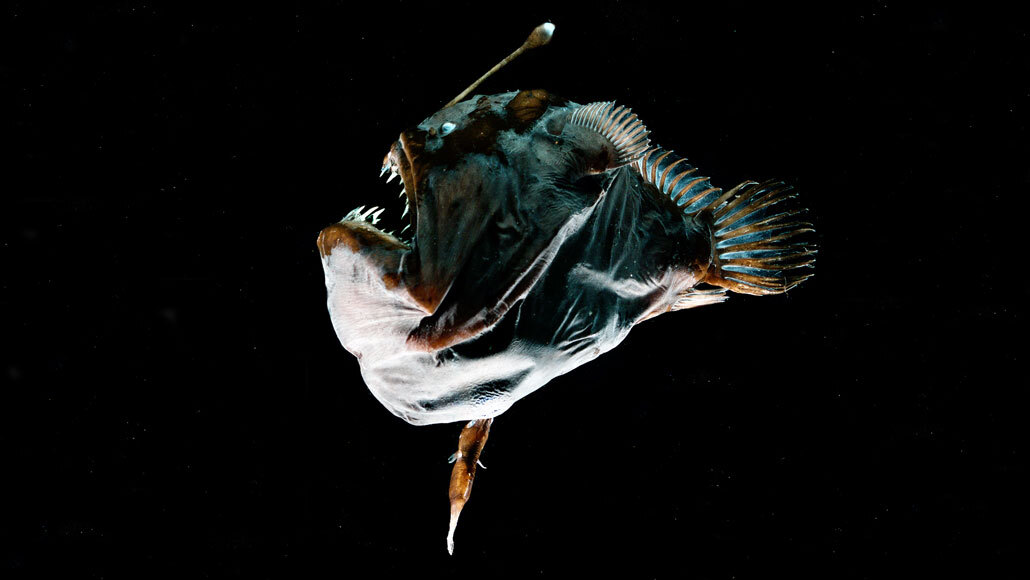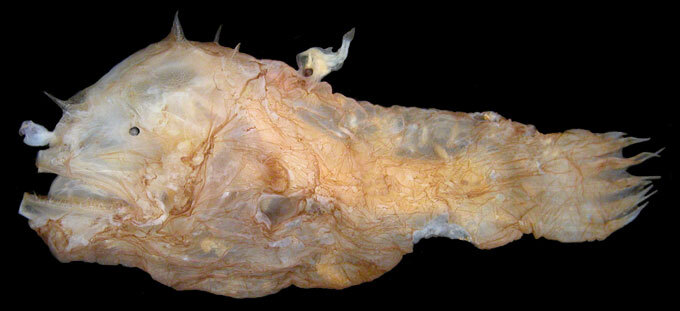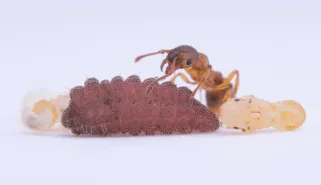
Male deep-sea anglerfish fuse to much larger females during mating, such as this male Melanocetus johnsonii attached to the belly of a female. The loss of key immune system genes may explain how the fish pull off the feat.
Edith A. Widder
For deep-sea anglerfishes, sex resembles an organ transplant. It’s hard to find a partner in the dark depths, so a tiny male anglerfish fuses its tissues to a more massive female during mating, allowing the two to share not only sperm but even blood and skin (SN: 7/26/75). The creatures are the only animals known to mate in this parasitic way.
How males and females fuse and avoid being rejected by each other’s immune systems — like a mismatched organ transplant — has been a mystery. Now, a study finds that anglerfish might not have to evade the immune system in the first place. Some species lack key genes involved in the body’s immune response, which may make fusion without deadly consequences possible, researchers report online July 30 in Science.
In vertebrates, immune protection typically involves a bodily response called adaptive immunity that identifies and eliminates foreign threats like viruses. Immune cells, such as T cells, recognize fragments of invaders and present those pieces to other cells that then mount an attack. In another line of defense, proteins called antibodies bind to trespassers to mark them for removal by the immune system. In organ transplants, such responses can cause the new organ to fail.
The deep-sea anglerfishes’ missing genes are involved in making those systems work.
“When you look at [these fish], you scratch your head and think, ‘How is that possible?’” says Thomas Boehm, an immunologist at the Max Planck Institute of Immunobiology and Epigenetics in Freiburg, Germany. In humans, it’s often difficult to find the right match for organ transplants because of the adaptive immune system, “but these creatures seem to be doing it without knowing what’s going on.”
Boehm and colleagues isolated DNA from 31 preserved anglerfish representing 10 deep-sea species. In four of the species, males attach to females only temporarily. In the other six, the fusion is permanent, with either one or multiple males attached to a single female. The researchers also scanned the genetic blueprints of three species that live in shallow waters and don’t attach during mating.

Compared with anglerfishes that don’t fuse to their mates, species that fuse are missing genes that help produce new antibodies that get better at binding to perceived threats in future encounters. Not having those antibodies might be helpful for a female that is exposed to multiple males throughout life, Boehm says. Some anglerfishes that unite permanently also lack genes needed to make the parts of T cells that help identify foreign tissue and pathogens.
Two of the species in which multiple males can attach to a single female — Photocorynus spiniceps and Haplophryne mollis — may not make antibodies at all. “If I had to diagnose [those two fish] … I would say, ‘OK, this is red alert, we really have to do something because this is severe combined immunodeficiency. Fatal prognosis,’” Boehm says. People with severe combined immunodeficiency — a condition in which genetic defects result in a weak immune system — often die within the first year of life.
The researchers didn’t do any laboratory experiments to confirm how the missing genes might affect the immune system’s behavior. Without such data, it’s hard to know what the lack of these genes means for things like fighting off pathogens. “How are they balancing … reproduction and response to infections?” asks Natalie Steinel, an immunologist at the University of Massachusetts Lowell. “It seems, at least genetically, that they’ve put all their chips on reproduction.”
Sign up for our newsletter
We summarize the week's scientific breakthroughs every Thursday.
The researchers’ findings highlight the various forms creatures’ immune systems can take — not only within vertebrates at large, but also within a single group of fishes, Steinel says. “It’s really interesting to see the diversity of immune systems within these different species.”
It’s possible, though not probable, that anglerfishes have an adaptive immune system that is completely different from that of other vertebrates. Or the creatures may have evolved a nonspecific immune response that protects them from infections but not parasitic sex.
The fish “must have done something to compensate for adaptive immunity,” Boehm says. “We don’t know what that is, but that is for the future.”







